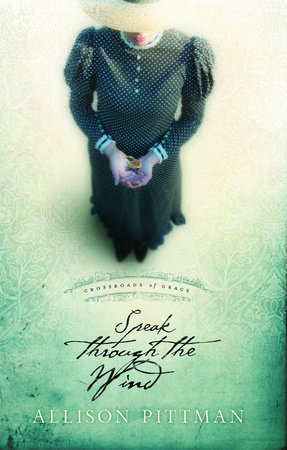Excerpt
Speak Through the Wind
Every Sunday Mr. Maroni built up a fire right on the corner of Mulberry and Bayard. After hauling out the big black cauldron from the back corner of his grocery, he tossed in the odds and ends of unwanted food–potatoes with black spots, limp carrots, turnips gone soft, greenish meat. To this he added water and whatever broth could be salvaged from the meat boiled for his own Saturday-night supper. All this he set simmering in the predawn hours of the city’s day of rest. By the time the first church bells rang, a perfectly respectable soup (or stew, or hash, depending on the ingredients and consistency) was available to the public. Mr. Maroni stood at the pot with a ladle the width and depth of a blacksmith’s fist, ready to serve anyone who came with a bowl and a penny.
On chilly autumn mornings like this one, the line formed early–sometimes before Mr. Maroni even had a chance to settle the pot over the flames. The drunks showed up first, reeling from a night full of rotten whiskey and eventually crumpling to the street to be trampled under the feet of the less intoxicated.
Then came the rowdy street boys, arriving in line as they moved through life–together. They whiled away their time in line knocking each other upside the head with battered and rusted tin cups. They taunted Mr. Maroni with threats of violence to his wife and his children if their serving was watery or thin, detailing just how they would torch his entire grocery if they found another cockroach at the bottom of a cup.
Sometimes a mother would show up with her entire brood and a handful of pennies–one for every ladle full dropped into her bucket. Later she would gather her children and divide the contents according to each child’s age and hunger, until, as it happened every week, there was only the barest broth left for her.
Then there was Kassandra. Small and slight, she lingered at the edge of the crowd, clutching a blue porcelain bowl. It had a tiny chip at its rim and a picture of a sparrow perched on a branch painted in its bottom. The bowl was deep enough to hold two servings of Mr. Maroni’ s soup, a fact not lost on the rowdy boys who elbowed each other relentlessly in front of her in line.
“Better have yourself two pennies for that,” one said, his beady eyes staring hungrily at Kassandra’s bowl as he patted his own piece of broken pottery nervously against his leg.
“Aw, leave ’er alone,” said another boy. Taller than the rest, his red hair sprang from his head like tiny curled flames. “She’s so scrawny, looks like she needs an extra bit.”
Kassandra said nothing, but clutched her bowl to her body and shuffled her bare feet closer to the bubbling cauldron. It would be the first meal she’d had in days, and the endurance of a few boys’ teasing seemed a small price to pay. She kept her attention focused on Mr. Maroni’s ladle as it sloshed its contents into the cups and bowls and jars of the men and women and children in front of her. Kassandra felt today would be a lucky one, that her place in line was just perfect. Too close to the front or too far back and you might get nothing but broth.
Soon, only the redheaded boy stood in front of her. He held his bowl out to Mr. Maroni, dug a penny from his pocket and dropped it into the grocer’ s outstretched hand. Two heartbeats later, Kassandra stood in front of that same outstretched hand, holding her bowl up until it was just level with her chin, focusing her large gray eyes on Mr. Maroni’s deep brown ones.
“Penny?” Mr. Maroni said.
Kassandra shook her head from side to side, then held her bowl a little higher.
“No got a penny?”
Kassandra shook her head, no.
“Well, then.” Mr. Maroni balanced his ladle across the top of the soup pot and crouched down until he was eye-level with Kassandra. He brought one long brown finger and tapped his right cheek. On command, Kassandra leaned forward and planted a tiny kiss, feeling the edges of his moustache tickle her lip.
“And again,” said Mr. Maroni, tapping the opposite cheek. Again, Kassandra leaned in to give a little kiss to that side.
“And here.” Kassandra had to go a bit to her toes to land a kiss on Mr. Maroni’s forehead, just between the bushy eyebrows almost equal in density to his moustache.
“Now, you want soup?” he said, flashing a cracked brown smile from beneath the black hair on his lip.
Kassandra nodded and tightened her grip on the blue porcelain bowl. She closed her eyes and leaned forward one more time, placing her own lips on Mr. Maroni’s. He tasted, as always, of olives, and she called on all her strength not to shudder against the bitterness.
“Now,
bella,” he said, “give this to me.”
He reached for her bowl, hooking one dirty thumb over the rim and cupping it from the bottom in his large hand. Within seconds, the bowl was full of two steaming helpings of Mr. Maroni’s Sunday soup–plus a delightful little piece of fat floating on the top–and she offered a small curtsy as the prostitutes behind her in the line laughed and tried to negotiate their own price for a free meal.
Kassandra gathered up her skirt, using the thin material as a shield against the hot bowl. She brought the bowl to her lips and allowed herself one tiny sip of the broth–just enough to burn the taste of Mr. Maroni from her mouth–before heading through the streets to find a quiet corner to savor her meal. Her body had grown dull to its hunger, but that little taste of the salty broth brought it to ravenous life again. An enticing bit of carrot floated near the top, but she had to hold the bowl with both hands, so retrieving it would be impossible before she found a place to settle down. Lately she’d been sleeping in a large building up the street where the peddlers parked their carts for the night. Now, as she looked around, she saw them in the streets, singing their songs and hawking their wares. The warehouse would be abandoned and quiet–perfect for a hot, leisurely meal and a good sleep to follow.
When the heat of the soup began to seep through the fabric of her skirt, Kassandra quickened her pace slightly, careful not to let one precious drop of broth slosh over the side. The anticipation was often more delicious than the soup itself. Somewhere in her blanket at the warehouse was half of a sourdough roll she’d found just yesterday. Left alone it was a flour-crusted stone, but Kassandra intended to plop it into this broth and let it sink down to the little bird, then she would mash great moist bits of it into her mouth.
The thought of it made her insist on one more taste, and without breaking stride, she brought the bowl to her lips. Had she not been so engrossed, so hungry, she probably would have seen the carriage careening down the street towards her. If nothing else, she would have heard the terrified cry of the horse as its driver pulled desperately on the reins. Instead, her first knowledge of the presence of the carriage or the horse came as something hit the bottom of her bowl. She felt the porcelain rim clink into her teeth and bump against her forehead, and she got one quick glimpse of the sparrow sitting on its branch just before two ladles full of Mr. Maroni’s Sunday soup flew into her wide, staring eyes.
She was surprised to hear herself scream. She thought her voice had completely closed up within her; it had been so long since she’d uttered a single sound. Yet here she was, her face alive with pain, surrounded by darkness as her eyes burned within. She fell to her knees, then straight to the ground. Some of the broth had gone up her nose and now choked her. She writhed on the street, calling, “
Mutter! Mutter!” although the memory of when such a call would bring her mother to her side was a memory all but lost.
However, she did soon feel a presence beside her. A hand took both of hers in its grip and another cradled the back of her neck. Kassandra had been touched enough to know it was a man, and she stiffened against his ministrations.
“Hush, now,” a gentle voice said. “Hush, little one. It’s going to be all right.”
Kassandra let her body go limp. Tears welled up behind her closed eyes, sending new waves of pain. She sensed a crowd had gathered, heard muttered conversations and a few hurled, angry words. The gentle hand that held her own released its grip, and the voice that had been so gentle in her ear now spoke loudly above her.
“She’s calling for her mother! Does anyone know where her mother is?”
Kassandra wanted to tell him that she had no mother, but when she opened her mouth to say so, she could only produce whimpers that called again for the woman.
“Well, then,” said the voice, “where does she live? What is her name?”
She knew nobody could answer him. Nobody knew her name, and she didn’t live anywhere. She wanted to tell the voice all of this, but before she could she was lifted by one strong arm under her legs and another around her waist. Then she was flying through the air until she finally felt a soft cushion beneath her. She tried to open her eyes, but the effort seemed too great and an onslaught of pain a promise, so she contented herself to enjoy the comfort.






